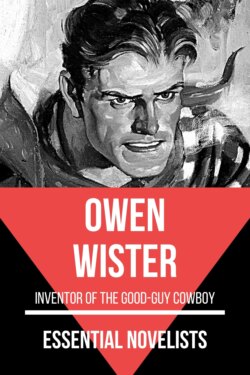Читать книгу Essential Novelists - Owen Wister - Owen Wister - Страница 1
На сайте Литреса книга снята с продажи.
The Author
ОглавлениеOwen Wister (1860-1938) was a prominent American writer during the late 1800s and early 1900s. He is best known as the author of the famed Western novel The Virginian. In addition, Wister was the author of numerous other works concerning the American West and other subjects as well.
Wister was born to Dr. Owen Jones Wister and Sarah Butler Wister in Germantown (now part of Philadelphia), Pennsylvania on July 14, 1860. His father was a physician and a member of a wealthy Philadelphia family. Wister’s mother was the daughter of Fanny Kemble, a famed Shakespearean actress.
Owen Wister grew up in a household that was considered to be a very cultured one. The family frequently traveled in Europe and both Wister and his mother spoke several languages. In addition, his mother was a respected pianist and essayist. Wister himself acquired a keen interest in music and learned to play the piano at an early age.
Wister attended St. Paul’s School, a boarding school in Concord, New Hampshire. Here, he discovered and started developing his talents as a writer. His first published story, Down in a Diving Bell, appeared in his school literary magazine in 1874. He continued to write for the magazine until his graduation in 1878.
Pursuing his interest in music, Owen Wister entered Harvard University. A music major and aspiring composer, he graduated summa cum laude in 1882. While at Harvard, he became a lifelong friend of fellow student and future president Theodore Roosevelt. After graduation he studied music in France for a year. Upon returning to the United States, Wister took a job at Union Safe Deposit Vaults in Boston.
Wister’s health broke down in 1885. On his doctor’s orders, he traveled to Wyoming to spend a summer at a friend’s ranch. This trip spurred his interest in the American West. Between 1885-1891, Wister made five trips to the West. On these trips, he kept diaries which provided material for his Western works. During these years, he kept himself busy in other ways as well. Wister graduated from Harvard Law School in 1888. He was admitted to the Philadelphia Bar and briefly practiced law at Francis Rawle’s law firm.
In 1891, Owen Wister wrote his first two Western short stories: Hank’s Woman and How Lin McLean Went East. Both of these stories appeared in Harper’s Weekly. Encouraged by the success of these stories, he gave up law and became a full-time writer in 1893. Between 1893-1900, Wister made several additional trips to the West. From material collected on these trips, he wrote the Western novel Lin McLean (1897) and Jimmy John Boss (1900), a collection of Western short stories. During this period, he also wrote the biographies U.S. Grant (1900) and The Seven Ages of Washington (1900).
In 1902, Wister published his most famous work, The Virginian. This book, which first appeared as a serial in Harper’s Weekly, is considered by many to be the prototypical Western novel. The Virginian is based upon material gathered on his Western trips. According to Wister, the novel’s main character was a composite of several people he met and knew in his travels. The book was a wildly popular bestseller, being reprinted numerous times and translated into many languages. In 1904, Wister and Kirk La Shell co-produced the original stage version of The Virginian, which had a successful ten-year run. The first motion picture version of The Virginian premiered in 1914.
After the success of The Virginian, Owen Wister continued to be a prolific writer. In 1904, he wrote Philosophy 4, a satirical short story about Harvard students studying for an exam. His second bestseller, Lady Baltimore, was published in 1906. This novel concerned society in Charleston, South Carolina. In 1911, he published Members of the Family, another collection of Western short stories.
When World War I broke out in 1914, Wister turned his attention to European affairs. A firm supporter of Great Britain and France, he pleaded for American support of the Allied war effort. In 1915, at the Duke University commencement, Wister delivered the speech The Pentecost of Calamity, in which he urged the United States to join the war against Germany. This speech was published and became a non-fiction bestseller. After the war, Wister frequently traveled to Europe and became friendly with noted European authors such as Joseph Conrad and Rudyard Kipling.
Between 1919-1930, Wister continued to be a productive author. Showing his continued concern for American relations with Europe, his works The Ancient Grudge or a Straight Deal (1920) and Neighbors Henceforth (1922) urged friendlier relations with Great Britain and France respectively. A staunch opponent of Prohibition, Wister wrote the satirical light opera Watch Your Thirst (1923) for Boston’s Tavern Club. When the West was West, another collection of Western short stories, was published in 1928. In 1930, he wrote his last book, Roosevelt, the Story of a Friendship, which documented his lifelong friendship with Theodore Roosevelt.
Owen Wister had many other interests besides literature. In 1908, he unsuccessfully ran for a seat on the Philadelphia City Council. He was a member of Harvard University’s Board of Overseers and president of both the Library Company of Philadelphia and the Philadelphia Club. Wister received honorary degrees from the University of Pennsylvania (1907), Williams College (1912), and Duke University (1915).
In 1898, Owen Wister married Mary Channing Wister. A second cousin once removed, she was a descendent of abolitionist and Unitarian preacher William Ellery Channing. Mrs. Wister was a respected member of the Philadelphia School Board. Before her death in 1913, the couple had six children, including daughter Frances K. Stokes.
Owen Wister passed away on July 23, 1938.
